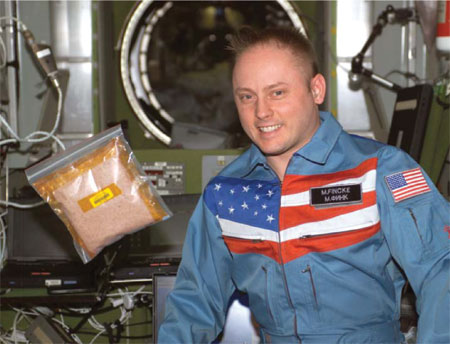
Last year, Mike Fincke fulfilled his life’s dream
of traveling to space. For six months, the Air Force Lieutenant,
aeronautical engineer, and planetary scientist lived and
worked with Russian Cosmonaut Gennady Padalka, serving as
scientific head of the mission despite the fact that he’d
never been to space before. Fincke says he was scheduled
for a flight on the Space Shuttle first, but it was canceled
after the Columbia tragedy. “It was unusual
for me as a rookie to have the chance to go to the Space
Station on my first mission.”
The rookie got his big break, and he’s savored every
second of it. In fact, the one thing that surprised even
Mike Fincke about his six months in space was how much he
really loved it. “I wondered before I went if I’d
really enjoy it, especially for six months,” Fincke
recalls. “But I absolutely loved it! Just the wonder
of looking at our planet from space…I never got tired
of it.” And he has the photos to prove it—21,000
in all.
Fincke began dreaming about space travel when he was 3
years old and “started seeing human beings walking
on the moon.” He watched every Apollo mission on television—and,
he says proudly, he had the advantage of living in Pittsburgh,
where a young kid’s astronomical dreams could be well
nurtured.
“My parents fostered my interests by taking me to
Buhl Planetarium,” Fincke says. “We’d
go there all the time…and then we started going to
the Natural History Museum, too.”
Fincke made a point of establishing ties with Carnegie Science
Center, home of the new Henry Buhl, Jr., Planetarium, after
it opened in 1991. “I was really impressed,”
he says of his first visit in 1996. A few years later, on
a family visit to Pittsburgh, he called the Science Center
and got a private tour. “I started a really good relationship
with the Science Center then, which I value.” Last
year, Fincke chose the Science Center as his one live downlink
site from space. More than 900 students gathered at the
Science Center to participate.
“A big part of our mission here at the Science Center
is to motivate kids to be lifetime learners and explorers,”
says Jo Haas, the Henry Buhl, Jr., Director of Carnegie
Science Center. “I can’t think of anything more
motivating than to interact with a man who has done exactly
that—lived out his dreams through the exploration
of science and, ultimately, space. The downlink was really
a special event.
“Mike has become such a good friend to Carnegie Science
Center,” Haas adds. “We’re looking forward
to welcoming him back—this time, on the ground and
not via satellite—to speak at the 2005 Awards
for Excellence.”
Mike Fincke agrees that his life story is pretty inspiring.
“That a guy from a blue-collar background like me
could dream of going to space and then grow up and actually
do it is an amazing thing,” he says
Now that his life’s dream is fulfilled, what’s
a 37-year-old dreamer to do? “I’d love to go
back and walk on the moon someday, or be part of a mission
to Mars,” Fincke says. In the meantime, he’s
content “changing diapers, trying my best to be a
good husband and a good father…and doing what I can
to support my country and the space program, which I love
to do.”
As he spreads the word about the space program, just don’t
expect him to talk about what it’s like having the
“right stuff” to be a scientist in space. “Everyone
has a dream and certain skills,” he says. “What’s
neat is that our country has the prosperity that allows
us to pursue our passions. That’s what I did. But
I still can’t play the piano worth a dime.”
Back
| Top |